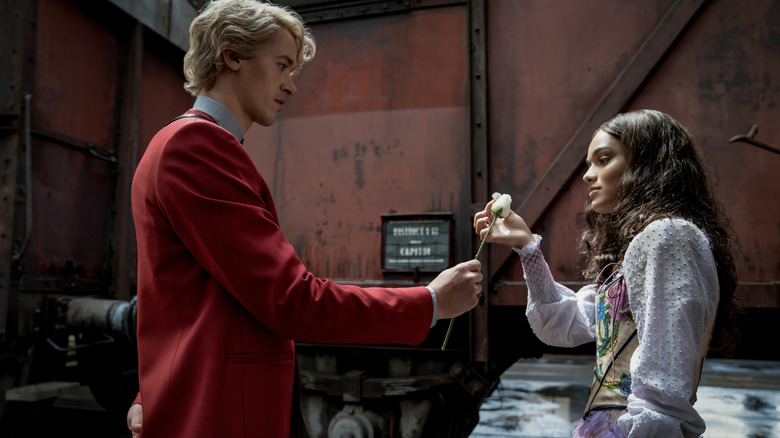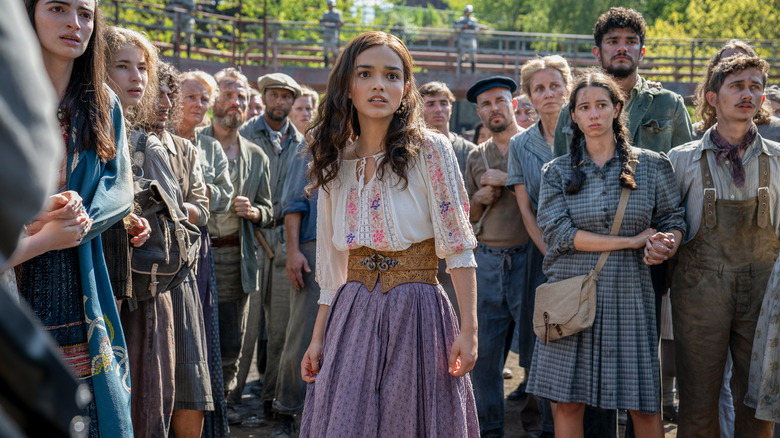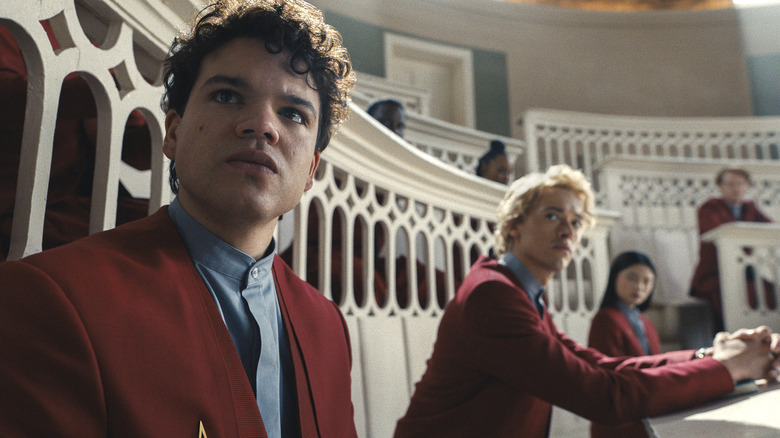The Hunger Games: The Ballad Of Songbirds And Snakes Review: A Half-Decent But Overstuffed Prequel
For better or worse, "The Hunger Games: The Ballad Of Songbirds and Snakes" cuts directly to the heart of the matter in the early going. Set only 10 years after the first rebellion of the various Districts that led to the implementation of the Hunger Games in the first place, the wealthy decision-makers of the Capitol are struggling to make the deadly arena fights feel vital and relevant to the battered, war-torn populace of Panem. It's trickier than they thought, as it turns out, to transform collective punishment into mass entertainment. Having assembled some of the best and brightest academy students to help solve this problem, there comes a moment when Dean Casca Highbottom (Peter Dinklage) all but reaches through the screen, channels his inner studio executive, and verbalizes the central issue at the core of a prequel like this: "If the Games are to go on, there must be an audience."
In other words, both he and the movie itself are posing a very simple, if on-the-nose question to us: What makes any of us want to return to the Hunger Games — especially over eight years after the original franchise came to a close?
This is a mystery that the prequel spends the rest of its bloated runtime (an interminable two hours and 45 minutes) attempting to solve, both in-universe and in a more metatextual sense, but ultimately reaches no satisfying conclusion on either front. Adapted from acclaimed author Suzanne Collins' 2020 spin-off novel and directed by returning filmmaker Francis Lawrence, who helmed the latter three "Hunger Games" movies to various degrees of success, "The Ballad Of Songbirds and Snakes" does its best to make this whole endeavor feel much more meaningful than just another instance of blatant brand management in an era of shameless IP-mining — a sleight-of-hand trick that would make the Gamemakers themselves proud. On paper, telling an origin story about the rise of authoritarianism through the eyes of a young Coriolanus Snow (Tom Blyth), who we know will go on to become the ruthless president fated to clash with the likes of Katniss Everdeen some six decades in the future, certainly carries weight.
In practice, however, intermittent flashes of potential — mostly found in the first and better half of the movie — can't quite save this feature-length foregone conclusion from itself.
Love in the time of the Hunger Games
There's something to be said for how hard "The Ballad of Songbirds and Snakes" strains against its own limitations to deliver something greater than the sum of its parts. Although not entirely successful in this regard, in many ways, that's what makes this an exact representation of Coriolanus' own journey. An opening prologue quickly (and clunkily) establishes his beginnings from a traumatized survivor of war (albeit on the side of the oppressors) to an ambitious orphan forced to provide for his now-destitute family to a simple young man reminded by a song that he has the capacity for great good ... along with unspeakable evil. Much of this, poignantly enough, is explored through the beginnings of romance between him and a certain tribute from District 12.
Thankfully, the entire film livens up and kicks into gear the moment Rachel Zegler appears on-screen as Lucy Gray Baird, reenacting what Jennifer Lawrence once brought to life back in 2012 with a twist. When her name is called in the Reaping early on, Lucy Gray holds her head high as she struts towards the podium in front of many hostile eyes, drops a snake down the back of a hated rival who set her up to be called in the first place, and belts out a soulful ballad in front of the cameras that manages to touch the heart of Coriolanus all the way in the Capitol, immediately smitten by this strong-willed tribute that he's been assigned to mentor in the Games. Since this is resolutely the once and future President Snow's story, of course, the script (written by Michael Lesslie and Michael Arndt) relies on a number of these book-accurate, show-stopping moments to get across the intricacies of Lucy Gray's personality and interiority in lieu of quieter character moments from her own perspective — and the impossibly talented Zegler is more than suited to the task.
Not even a somewhat distracting Southern accent manages to dull any of her high-wattage charisma, although the same can't be said for Blyth's much colder and unavoidably blander performance as Coriolanus. It's tempting to compare this to Zegler's star-making turn in Steven Spielberg's "West Side Story," which saddled her with the challenge of spinning straw into gold while acting against the uncompelling Ansel Elgort and all his baggage, but Blyth at least finds moments of genuine emotional truth amid the film's bleak tone. If you squint, you can imagine a reality where someone bursting with as much passion and life as Lucy Gray might actually give the brooding Coriolanus the time of day, let alone forge a star-crossed, Romeo and Juliet-like bond tinged with impending tragedy. And when things inevitably take a darker turn, material which Blyth is far better suited for, the pregnant pauses between Lucy Gray's stirring songs (like her rendition of "The Hanging Tree") hit just as hard as intended.
Make no mistake: "The Ballad of Songbirds and Snakes" lives and dies on the strength of Rachel Zegler's sheer force of will.
Let the Games begin?
For all its grander aims, however, this is ultimately a "Hunger Games" movie — with all the franchise expectations that come with it. Diehard fans will have plenty to sink their teeth into here, from tossed-off Easter eggs and references to name-drops that occasionally land with a self-conscious thud. More casual audiences might have a harder time finding reasons to stay engaged, particularly when the world-building feels much thinner and stripped-down compared to the previous movies. In fact, it's to Lawrence and cinematographer Jo Willems' credit that one can practically sense them searching for interesting shots and unexpected areas to place the camera, despite being saddled with much less dynamic locations and sets than the previous films (a natural byproduct of the prequel setting and the nascent Capitol's prominence in the story, to be fair).
This is where the film's quietly chaotic casting makes up the difference, especially in the central Hunger Games pitting all the tributes and, behind the scenes, their Capitol-backed mentors against one another in as harrowing and brutal an extended sequence as we've seen. A thoroughly unhinged Viola Davis practically makes a feast out of every line of dialogue as Head Gamemaker Dr. Volumnia Gaul, a figure who looms large in Snow's gradual devolution to the monster he becomes, as does the delightfully over-the-top Jason Schwartzman as Lucky Flickerman, a weatherman/"amateur magician" who becomes the inaugural host of the Games and gets the bulk of the film's killer one-liners. ("Game of Thrones" fans will also get a kick out of Dinklage's frequent conversations with a character whose surname is "Snow.") But it's Zegler's former "West Side Story" co-star Josh Andrés Rivera who shines the most out of the supporting cast as Snow's friend Sejanus Plinth, a conflicted mentor whose allegiances parallel and juxtapose against Coriolanus' motivations in exciting and unexpected ways. Taken together, these colorful additions almost counteract the familiarity of these minimalistic and decidedly unspectacular Games.
Unfortunately, the conclusion of this sequence in the film's middle act (the structure of the film is split up into three parts with three distinct title cards, in a stark departure from the prior movies) also marks the moment where the film's pacing completely runs out of steam. Whether the product of an unwieldy script or a little too much fidelity to the source material, "Songbirds and Snakes" reaches what feels like a natural conclusion to an intentionally smaller-scale story ... only to blow right by it and shamble onwards for another hour. Already a talky enough movie as it is, the oddly perfunctory and dramatically inert stretch leading to its conclusion might even try the patience of the most invested fans.
For all the storylines it juggles — part love story, part franchise extension, and part treatise on how mind-numbingly awful group projects in class can be (seriously, this early section might actually be the highlight of the movie) — "The Ballad of Songbirds and Snakes" feels caught between its humbler, more character-driven aims and the blockbuster expectations of reinvigorating a brand. In the end, despite its efforts, it'll be interesting to see if an audience on par with "The Hunger Games" actually materializes for a movie like this. If not, Gamemakers and Lionsgate alike may have to accept an unpleasant conclusion: maybe the Games shouldn't go on, after all.
/Film rating: 5 out of 10


